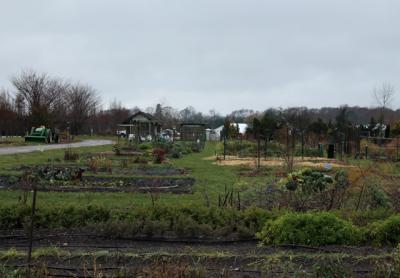Arsenic Tests Gratify EECO Farm

Soil tests at the East End Community Organic Farm on Long Lane, which were taken in October at the behest of East Hampton Town, have shown a 33-percent drop in average arsenic content from levels in 2005. The result is consistent with what the cooperative farm’s board members say were their own test results, which have been called into question over the years.
The results were reported at a work session of the town board on Tuesday by Kim Shaw, the director of natural resources, and Mellissa Winslow, an environmental analyst. It was welcome news for the farm’s board members, some of whom said they hope the new results would put to bed any lingering community fears that there was a hazardous level of arsenic there.
Soil samples were taken on Oct. 12 by American Analytical Laboratories. The average arsenic concentration was 27.1 milligrams per kilogram, a decrease of 33.25 percent from the 2005 result of 40.6 milligrams per kilogram. Individual samples taken in October ranged from 10.6 to 31.8 milligrams per kilogram.
In addition to the soil samples, two vegetable samples — a squash and a pepper — were also collected for testing. They had “non-detectable” levels of arsenic.
Don Cirillo, an EECO Farm board member for the last 10 years, said during the work session that the farm had spent hundreds of dollars each year testing the soil and the water, and found them to be below acceptable European Union standards. New York State and the United States do not have such standards for arsenic, which is a naturally occurring element in soil, but which had been heavily applied as an agricultural pesticide in the past.
“We’re very pleased that they found what we did,” Mr. Cirillo said after the work session. “Now it’s been officially done by an outside agency. It was random. The town got their own test group. Those are their conclusions. Nobody can blame us, it was all hands-off, and they pretty much gave us a clean bill of health and said we are no worse off than many other places on Long Island. This should be the end of it.”
Following the session, Alex Balsam, an Amagansett farmer and attorney who is also an EECO Farm board member, said the organization was “very happy and encouraged with what we heard today.” Calling EECO Farm “a huge community asset,” he said the positive attributes of EECO Farm “certainly are negatively impacted by an ongoing discussion about arsenic that is not always science-based. I’m hopeful that some positive, science-based analysis, which we saw today, will help alleviate some of the concerns regarding the parcel. . . . It was a good day for us.”
Mr. Balsam said that over the last several years, EECO Farm had mitigated arsenic levels by increasing organic matter in the soil through planting cover crops and composting. He called the new results “a testament to the good farming practices that are going on by all the growers and the gardeners at EECO Farm.”
Sandra Menasha, a vegetable and potato specialist with Cornell Cooperative Extension of Suffolk County, said the New York State Department of Health had concluded that “soil arsenic levels at EECO Farm do not pose an immediate health hazard.” She also applauded EECO Farm “for taking appropriate actions.”
Word that the test results were ready had circulated in the community and brought Prudence Carabine, among others, to the work session. Despite the results, Ms. Carabine, who is the director of the East Hampton Historical Farm Museum, expressed lingering concern. She reminded those in attendance about what she said had been a suspected “cancer cluster” among East Hampton High School students several years ago. The school is also on former farmland on Long Lane.
“I must say that I’m sad to keep addressing this subject, because it’s painful to me, but the reality is that we have a wonderful farm called EECO Farm which has been continually tested — thank you — and still shows the presence of arsenic. I feel very strongly, and I’m going to say this three times, EECO Farm is doing the right thing by mitigating this poison . . . but the fact is that the poison is not going away within my lifetime and probably will not go away within the next 50, 60, 70 years.”
